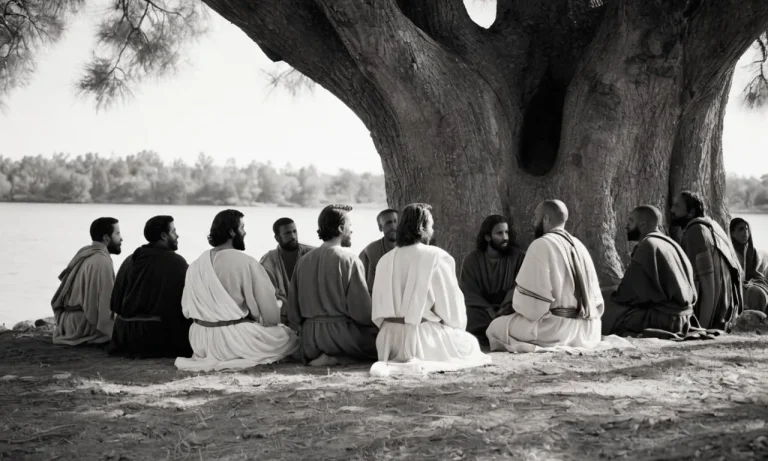What Does The Bible Say About Boundaries?
Setting healthy boundaries is an important part of living a Godly life. Boundaries create order, provide protection, and help us build strong relationships that honor both ourselves and others. But what exactly does the Bible say about setting boundaries?
If you’re short on time, here’s a quick answer: The Bible encourages believers to set wise boundaries in relationships and activities to live balanced, upright lives that avoid sin and reflect God’s holiness and love.
In this comprehensive article, we will explore various biblical principles and passages concerning boundaries, their purposes, and how you can establish ones that align with scriptural guidance.
Defining Boundaries Biblically
What Are Boundaries?
Boundaries are personal limits and rules we set for ourselves to guide interactions with others. They define where one person ends and another begins, establishing clear lines of protection, privacy, and personal space.
Biblically speaking, boundaries reflect God’s limits and divisions he set forth in creation (Genesis 1:4-10). Just as God separated light from darkness, sea from land, humans must discern and enforce proper relational divides.
Why Boundaries Matter
Healthy boundaries are vital for living wisely (Proverbs 2:11). They prevent chaos, confusion, burnout, toxicity, abuse, and exploitation. Boundaries allow us to embrace interdependency rather than independence or codependency in relationships.
Through proper boundaries, we take responsibility for ourselves without controlling others. We understand our own limits without blaming limits we impose on others.
Appropriate boundaries free us to respect our bodies as temples of God (1 Corinthians 6:19). They empower us to direct time, energy and resources toward productive and uplifting relationships while avoiding unhealthy entanglements.
Boundaries help us clarify when to unite together in the faith community and when to set ourselves apart for rest and solitude with God.
Biblical Sources on Boundaries
Several Bible verses and passages provide wisdom related to setting boundaries:
- Proverbs 25:28 – A lack of self-control/restraint is like a city without walls opened to attack. Good boundaries act as defending walls against relational intrusions.
- Acts 17:26 – God designated proper times and fixed boundaries where people should live. We must discern boundary lines divine wisdom establishes in human connections.
- Genesis 2:24 – In marriage, partners bind together in one flesh through covenant love. Yet that marital oneness exists within boundaries limiting physical intimacy to spouses alone.
- Matthew 6:33 – Seeking God’s kingdom should remain the top priority over meeting other’s demands upon our time and resources.
In exercising spiritual discernment, Christians must judge when boundary violations call for grace-giving or tough love (Galatians 5:13-14). Jesus himself often withdrew to lonely places and set limits around his involvement in some matters (Luke 5:16).
Yet he also took initiative to break down divisive walls, as between Samaritans and Jews (John 4:1-26).
As isolation increases anxiety today, we need enhance appropriate connections. Boundaries help ensure relationships heal rather than wound. By owning our boundaries as God-given and protectively loving rather than cold legalism, we can filter intimacy to deepen bonds within biblical barriers.
With open yetbounded hearts, we live out Jesus’ call to neighborly love (Mark 12:31).
Principles for Godly Boundaries
Boundaries Promote Self Control
Establishing healthy boundaries allows us to take responsibility for our own thoughts, emotions, and behaviors. As Galatians 5:23 states, self-control is a fruit of the Spirit. Rather than blaming others for our problems, boundaries help us focus inward and exercise discipline over the aspects of our lives that we can control.
For example, if we have a habit of envy, rather than obsessing over what others have, we can set a boundary around our thought life and replace envious thoughts with gratitude for what we do have. This self-restraint prevents our hearts from veering down an unhealthy path.
Boundaries Protect From Harm
In the same vein, boundaries guard our hearts from external harmful influences. As Proverbs 4:23 urges, “Above all else, guard your heart, for everything you do flows from it.” Establishing wise boundaries helps filter out damaging media, relationships, or environments that could negatively impact us emotionally and spiritually.
For instance, limiting time spent consuming anxiety-inducing news stories creates space for more uplifting and constructive influences. Setting clear relational boundaries around manipulation or mistreatment can also preserve the health of a friendship or family dynamic.
Boundaries Help Prioritize Godly Things
Finally, the discipline of maintaining boundaries helps us properly order our lives and focus on what matters most. As Matthew 6:33 reminds us, we are to “seek first the kingdom of God and His righteousness.”
Using boundaries to say “no” to time-wasting activities makes room to say “yes” to meaningful service, rest, family time, and spiritual habits.
A 2022 survey by the Barna Group found that 87% of practicing Christians see boundaries around technology use as essential for prioritizing their faith. Setting these types of healthy technology boundaries can open up time for Scripture reading, prayer, or acts of service.
Examples of Biblical Boundaries
Jesus Set Boundaries to Protect His Time with God
Jesus knew the importance of setting boundaries to protect His time with God. Though people often wanted His attention and miracles, Jesus prioritized solitude and prayer. “Very early in the morning, while it was still dark, Jesus got up, left the house and went off to a solitary place, where he prayed” (Mark 1:35).
Praying and reading Scripture was an important boundary for Jesus to refresh and hear from His Heavenly Father.
Paul’s Boundaries Against Sexual Immorality
The Apostle Paul set clear boundaries regarding sexual purity. He warned believers to flee sexual immorality and honor God with their bodies (1 Corinthians 6:18-20). Paul instructed the Thessalonians, “It is God’s will that you should be sanctified: that you should avoid sexual immorality” (1 Thessalonians 4:3).
He reminded believers their bodies were temples of the Holy Spirit and exhorted them to glorify God with their lives.
Nehemiah’s Protection of Sacred Work Boundaries
When Nehemiah led the project to rebuild Jerusalem’s walls, he set boundaries to protect the workers from distraction. “From that day on, half of my men did the work, while the other half were equipped with spears, shields, bows and armor” to guard against enemies (Nehemiah 4:16).
Nehemiah refused to meet with deceivers who tried to lure him from the work (Nehemiah 6:2-4). His commitment to finish the walls demonstrated importance of protecting boundaries around God-given tasks.
How to Establish Biblical Boundaries
Assess Your Current Boundaries
Setting healthy boundaries starts with self-reflection. Take some time to examine your current boundaries. Are you overextending yourself to please others? Do you feel resentful that your needs aren’t being met? Do you have trouble saying no?
Assessing where you’re at is the first step toward making positive changes.
Consider journaling or discussing with a trusted friend if you struggle to identify boundary issues on your own. Getting an outside perspective can provide valuable insight. Once you’ve taken stock of where your boundaries need improvement, you can start establishing biblical principles to guide you.
Determine Your Boundary Needs
Now that you’ve assessed your boundaries, prayerfully determine what you need. Setting boundaries is not about walling yourself off from others. The Bible calls us to live in community, fellowship, and harmony as much as possible (Romans 12:16, Hebrews 10:24-25).
Healthy boundaries merely create space for you to thrive spiritually, emotionally, physically and mentally so that you can love others well. Consider what is draining your time, energy or emotions. Then determine what reasonable limits need to be put in place so these things don’t control you.
Your boundaries will be unique because God created each of us with different capacities and needs. Seek the Holy Spirit’s wisdom to discern your boundary needs. God knows you intimately and wants to guide you to freedom (Psalm 139:1-3).
Communicate Boundaries Lovingly But Firmly
Once you’ve determined your boundary needs through prayer and reflection, begin putting them into practice. Lovingly communicate your boundaries to others involved. Explain your limits and the reasons behind them. Share honestly but gently to avoid defensiveness.
Preface boundary conversations with statements like, “I care about our relationship, and I think this change could make it even healthier.”
After communicating a boundary, stick to it with grace and consistency. Don’t feel guilty about causing disappointment. You are not responsible for others’ reactions. And don’t waver once a boundary is set; wavering diminishes your credibility.
“Simply let your ‘Yes’ be ‘Yes,’ and your ‘No,’ ‘No'” (Matthew 5:37).
Finally, give others time to adjust to your new boundaries. Expect some resistance or testing at first. But maintain the boundaries with love. God can change hearts and bring unity if we let His wisdom guide our steps (Proverbs 3:5-6).
With His help, biblical boundaries foster flourishing relationships and lives that honor Him.
Conclusion
God desires for His followers to live purposeful, righteous lives. Setting wise biblical boundaries allows believers to prioritize serving and pleasing God while avoiding potentially harmful, sinful distractions.
Though establishing strong boundaries requires self examination, courage, and gracious communication, God promises to equip and aid those who seek His wisdom and righteousness in this area.








